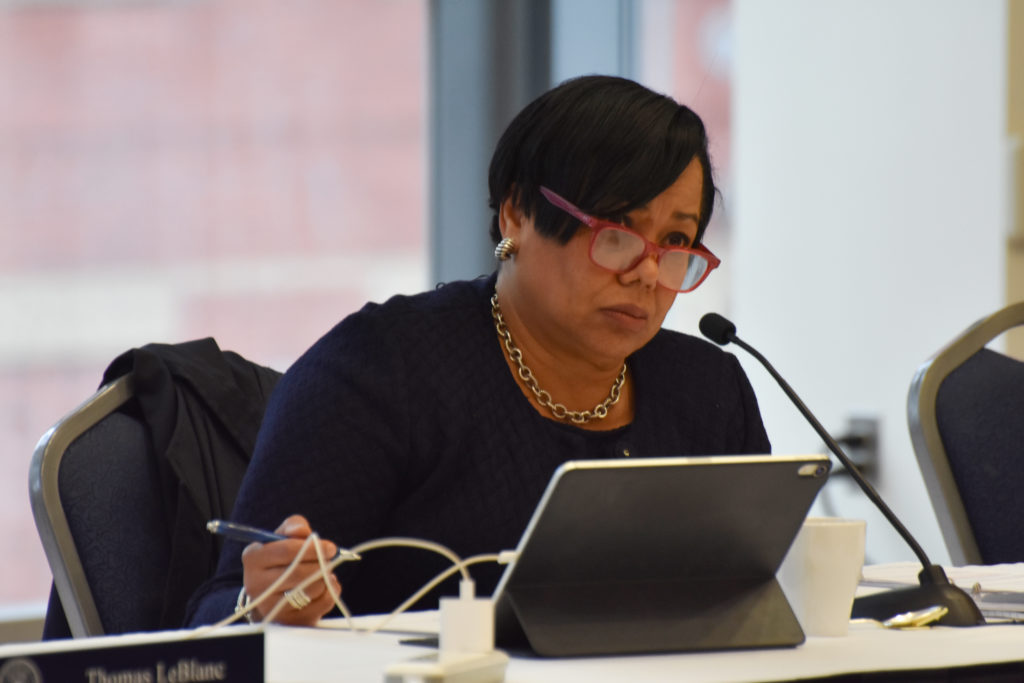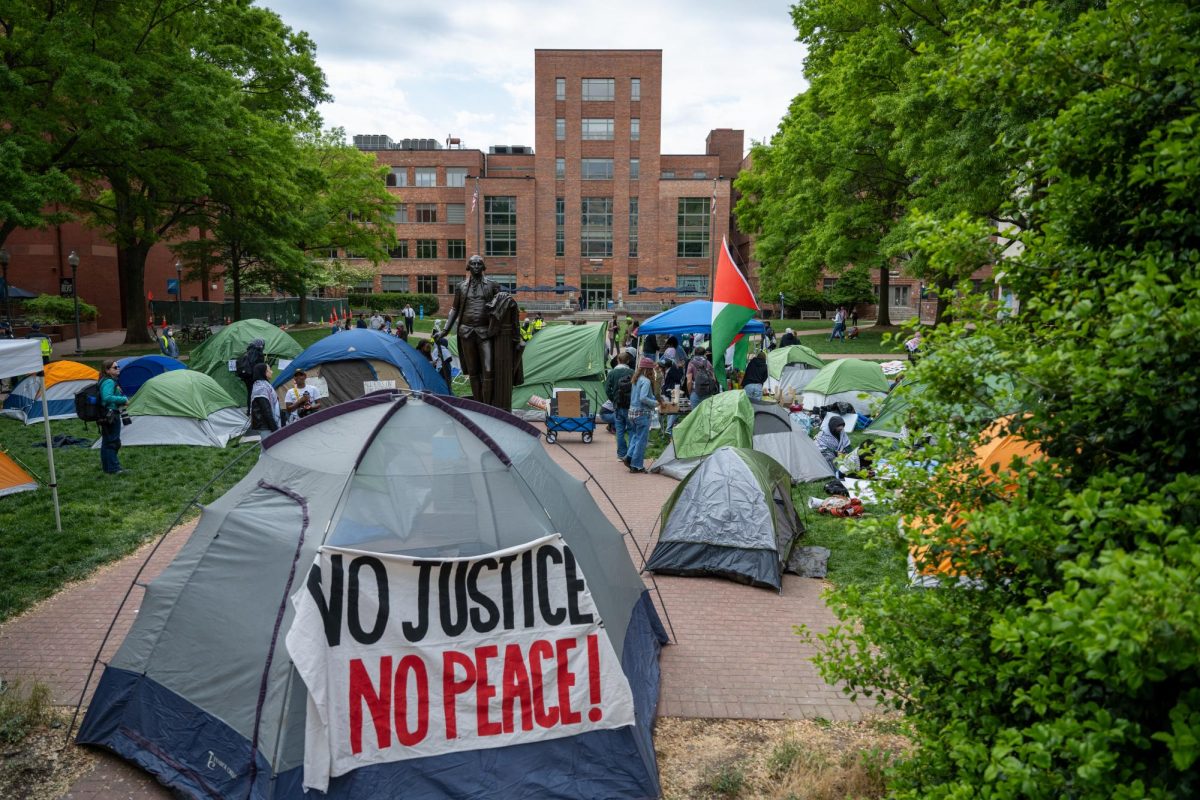University President Thomas LeBlanc lost the confidence of many faculty, staff and students during his tenure, but one group has remained steadfast in its public support for the embattled president: the Board of Trustees.
Trustees, many of whom voted to hire LeBlanc for the job in 2017, have repeatedly commended the president’s leadership during his time at GW through various statements and at Board meetings. The Board doubled down on their support through their message to the GW community after LeBlanc’s departure announcement, lauding his efforts to lead the University out of the COVID-19 pandemic.
“He navigated the challenges of a pandemic with a commitment to the safety and well-being of our campus community and worked to promote diversity and improve the student experience throughout his term,” Board Chair Grace Speights said in an email to the GW community Tuesday.
Trustee Madeleine Jacobs, who led the presidential search committee made up of trustees, faculty, a student and a staff member who eventually selected LeBlanc in 2017, said LeBlanc held unanimous support from the committee when officials announced he had been chosen for the position.
“In Dr. LeBlanc we saw a person who will elevate GW’s academic excellence, enhance the student experience and ensure that the University remains a diverse and inclusive partner with every segment of the University and local communities,” Jacobs said in 2017.
During his tenure, LeBlanc worked to advance many of the priorities highlighted in the Board’s hiring announcement. LeBlanc made improving the student experience one of his five strategic initiatives and leveraged his computer science background to increase GW’s proportion of STEM students.
As the pandemic inflamed tensions between LeBlanc and faculty, Speights continued her support for LeBlanc as they worked to solve GW’s looming budget gap. Officials and trustees vowed to not tap the University’s endowment to mitigate the projected deficit, citing their fiduciary duty to preserve GW’s long-term financial health, instead identifying tens of millions in cuts.
Dozens of faculty had already called for LeBlanc’s removal just before the pandemic hit.
“President LeBlanc and his administration have done a remarkable job working diligently and tirelessly to steer our institution through this crisis and to prepare us for the future,” Speights told faculty senators last May as the first mitigation measures were implemented.
Within weeks, GW’s leadership began moving toward laying off hundreds of staff to balance the budget. Professors’ concerns were also compounded in the face of plans to reduce the size of the undergraduate population while increasing the percentage of STEM students, along with the hiring of Heather Swain.
Hundreds of students, faculty and staff demanded LeBlanc’s resignation by September, and then-Student Association President Howard Brookins issued an executive order calling for the University community to suspend donations to GW until LeBlanc stepped down.
At the Board’s open meeting the following month, Speights and Brookins openly sparred over his decision.
“As someone charged with leading a group dedicated to promoting the general welfare of students, encouraging a no-donate pledge is just incomprehensible to me and is just not something I would expect a leader in your position to do,” Speights told Brookins during the virtual meeting with trustees and GW’s senior leadership in attendance. “Donations are the lifeblood of GW and provide tremendous benefits to the students you serve.”
Speights acknowledged the growing frustrations with LeBlanc at the meeting but criticized Brookins’ move as “divisive,” adding that LeBlanc demonstrated “strong” leadership.
“The Board of Trustees appreciates and supports the outstanding work you and your leadership team have done to navigate circumstances unlike any we have ever experienced before,” Speights said.
At the Board’s next open meeting in February, Speights once again lauded LeBlanc’s leadership, saying he had done an “outstanding job.”
But at the Board’s first open meeting following the release of the results of the faculty survey on University leadership – held earlier this month – Speights was silent on LeBlanc’s leadership. LeBlanc has since said he told the Board he would depart GW during another portion of the meeting.
Speights released a statement to faculty members Wednesday stating that she had been “troubled” by some professors whose contributions have done more to “foment discord” than to contribute to civil dialogue.
“I am troubled by the actions of a faction of self-appointed faculty spokespersons whose contributions to this process more closely resemble a campaign to foment discord rather than civil dialogue,” she said.
Speights did not specify the actions by faculty that prompted her email.
The Faculty Association, an informal faculty union that has consistently criticized LeBlanc, referenced his departure in a number of tweets after the announcement, some containing vulgarities and memes.
Speights declined to say whether the Board’s ongoing standard review of the president – which the Board has been conducting this spring to decide whether to renew his contract – impacted the announcement that he would be stepping down. She declined to say how the Board’s views toward the president have changed over time.
University spokesperson Crystal Nosal said the Board has begun discussing the search process for the next president, but Speights declined to say when the search will start and whether LeBlanc will be involved.
Higher education experts said it’s unlikely LeBlanc himself chose to step down and said the Board may have asked him to do so in an effort to preserve the University’s reputation.
Demetri Morgan, an assistant professor of higher education at Loyola University Chicago, said since the Board hired LeBlanc, expressing outright disapproval of his actions would reflect poorly on their judgement.
“Not supporting your president is also an indictment on your decision making,” Morgan said. “It’s kind of like you want to stand by your person, so to speak.”
George Justice, a professor of English at Arizona State University who has written about higher education administration, said it’s possible that LeBlanc announced he would be stepping down at the end of his contract to avoid public removal by the Board in an effort to “save face” for the University.
“I would very strongly believe that they’ve been in pretty deep conversations over the last six months about what’s going on and decided to make this president’s and Board meeting in May the place where they announced it,” he said. “It’s also convenient to do it at the end of a semester – students have mostly dispersed by now, it doesn’t interfere with graduation, slow news cycle on campus.”








